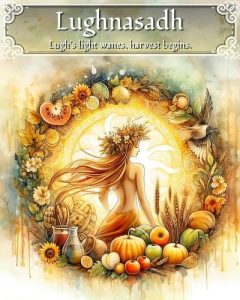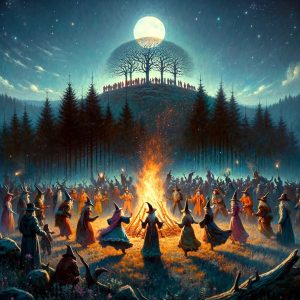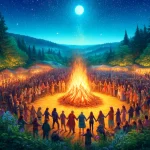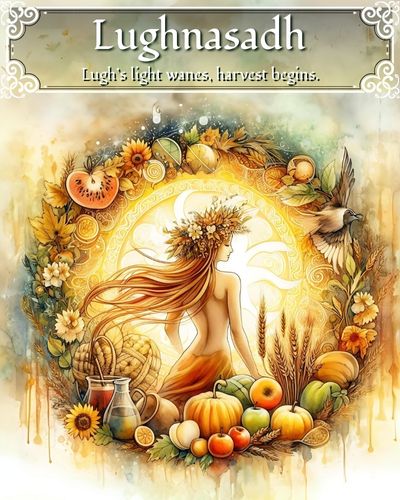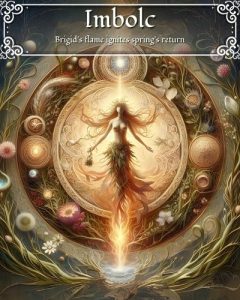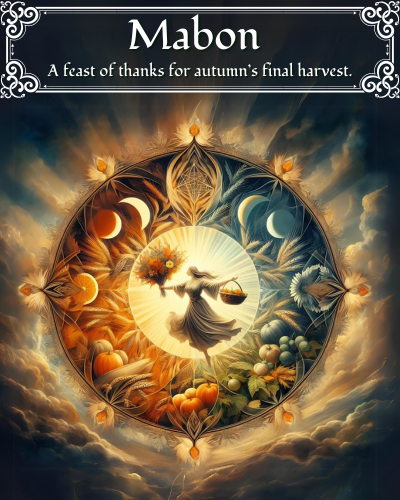
Approx. Reading time: About 4 Minutes

Introduction
Mabon, one of the Lesser Sabbats, is the second harvest festival and is held on the autumn equinox to celebrate the last fruits of the year. Like the Spring Equinox, it is a time of balance between dark and light. At this time we are moving from light to darkness, from warmth to cold, we are gathering the harvest of summer to prepare for the winter months.
This is the second of the three harvest festivals; the ripe grain is being reaped from the fields. Vegetable season is ending and the fall fruits, such as apples, are ready to pick. This is a time to celebrate with feasts and thanksgiving.
An equinox is an astronomical point, and due to the fact that the earth wobbles on its axis slightly, the date may vary by a few days, depending on the year. The autumnal equinox occurs when the sun crosses the equator on its journey southward, during this time we experience a day and a night that are of equal duration. Up until Mabon, the hours of daylight have been greater than the hours from dusk to dawn. But from now on, the reverse takes place.
The Welsh Connection
In 1970 Aidan Kelly, a folklorist and poet attached the name Mabon to the Fall Equinox.
He acknowledges that his sources were all literary and not historical. The most influential author among them was Gerald Gardner, followed by the poet Robert Graves and then a list of lesser names including Margaret Murray and Doreen Valiente.
Kelly based this on an interpretation of the story of the Child of Light, Mabon, and the son of the Great Mother, Modron. Mabon, the son of Modron, was stolen from his mother only three nights after his birth at the beginning of time. The Great Mother grieved for her son and the world became dark and cold. During her mourning plants withered and died, and the animals, fat from the summer fruits, slept in their caves to protect themselves from the coming winter.
Mabon is eventually found, with the help of the wisdom and memory of the Oldest Animals – the Blackbird, the Stag, the Owl, the Eagle, and the Salmon. The battle to release the Child of Light is not an easy one and will take months to complete. Ever since Mabon was stolen, the seasons of cold and darkness prevail in sync with the grieving Mother Earth, feeling the loss of Her child. Because Modron’s child is imprisoned deep within the earth, the plants and animals of the earth slow down and move inward. Mabon is eventually found, although he will not be released until Yule when the days again begin to grow longer. At Yule, Mabon is reborn as the Child of Promise and the Son of Light.
The Wiccan Tradition
Even though Mabon was named after a Welsh deity, most Wiccans don’t hold the festival in his honor. Instead, there are many other Mabon deities you can raise a glass to this fall.
During this time, we see the moon goddess lie down and begin her descent. As the harvest nears its end, she enters her final Crone stage. The aging goddess has wild yet hidden energy, which is also abundant in several other female deities. So if you want to honor one of them, you can call on Hecate, Lilith, or the Morrígan.
The Druids call this celebration, Mea’n Fo’mhair, and honor the Green Man, the God of the Forest, by offering libations to trees. Offerings of ciders, wines, herbs, and fertilizer are appropriate at this time. Wiccans celebrate the aging Goddess as she passes from Mother to Crone, and her consort the God as he prepares for death and re-birth.
No matter the name you call it, the Fall Equinox is a time of celebration and balance, it is a time to finish the old and to ready ourselves for a period of rest, relaxation, and reflection.

Mabon Activities
- Celebrate this festival with a feast shared with family or Coven members.
- Private Meditation on the meanings of Mabon.
- Take a walk outside and enjoy the cooling weather.
- Eat a meal of fruits and vegetables of the season.
- Arrange baskets of fresh fruit for friends or family.
- Fill a bowl with fruits and leave it as an offering to the gods.
- Make a protection charm of hazelnuts strung on red thread.
- Hang dried ears of corn on the front door, doorposts, or outside light fixture.
- Fill a basket with pinecones, colorful dried leaves, wheat, acorns, and fallen pine branches and leave it by your door.
- Serve a Mabon meal, wine with some sort of soup with carrots, onions, potatoes, radishes, and/or corn.
- Collect milkweed pods to decorate at Yuletide and attract the fairies.
- Make wine.
- It is a good time to walk the forests, gathering dried plants for use as altar decorations or herbal magic.
- Go to an Autumn Festival.
- Make a witch’s broom.
- Make magic Apple Dolls.
- Gather autumn leaves in bright colors.
Deity’s Portfolio
- Division: Minor Sabbat
- Other Names: Madron, Autumn Equinox, Harvest Home, Pagan Thanksgiving, Fall Equinox, Second Harvest, Festival of Dionysus, Wine Harvest, Alban Elfed, Cornucopia.
- Southern Hemisphere Date: March 20-23
- Northern Hemisphere Date: September 21
- Associated Holiday: Thanksgiving (Second Harvest)
- Associated Deities: Mabon, Madron, Persephone, Demeter.
- Associated Herbs: Marigold, Sunflowers, Hibiscus, Rose petals, Myrrh.
- Associated Stones: Sapphire, lapis lazuli, Amber, Clear Quartz, Tigers Eye, Citrine, and yellow agates.
- Symbols of Mabon: wine, gourds, pinecones, acorns, grains, corn, apples, pomegranates, vines such as ivy, dried seeds, and horns of plenty.
- Foods of Mabon: Breads, nuts, apples, pomegranates, and vegetables such as potatoes, carrots, and onions.
- Drinks of Mabon: Wine, Ale, and Cider
- Incense of Mabon: Autumn Blend-benzoin, myrrh, and sage.
- Ritual Oils: Apple Blossom, Hay/Straw, Black Pepper, Patchouly
- Colors: of Mabon: Red, orange, russet, maroon, brown, and gold.
- Taboos: Passing Burial Sites and not honoring the dead.
- Plants: Vines, Ivy, Hazel, Cedar, Hops, Tabacco
- Element: Water
- Animals: Dogs, Wolves, Stags, Birds of Prey (especially the Blackbird, Owl, and Eagle), Salmon and Goat
- Mythical Creatures: Gnomes, Sphinx, Minotaurs, and Cyclops
- Celebration of: The God now sleeps within the womb of the Goddess.







